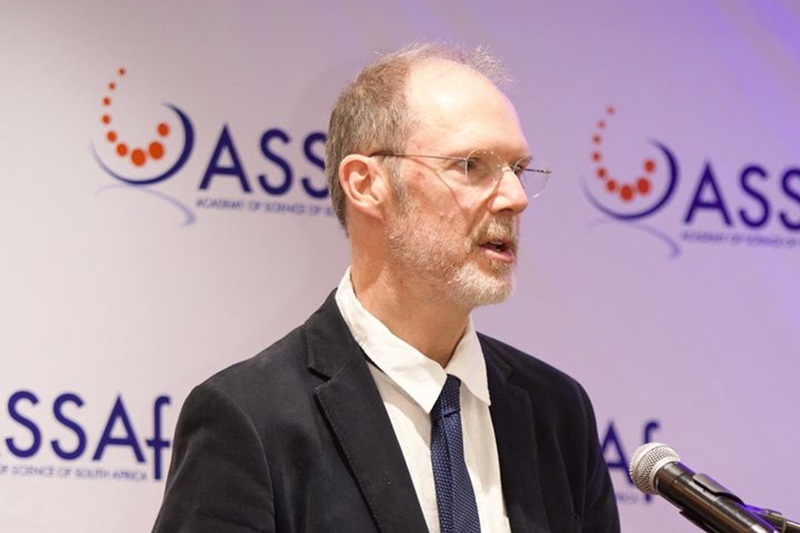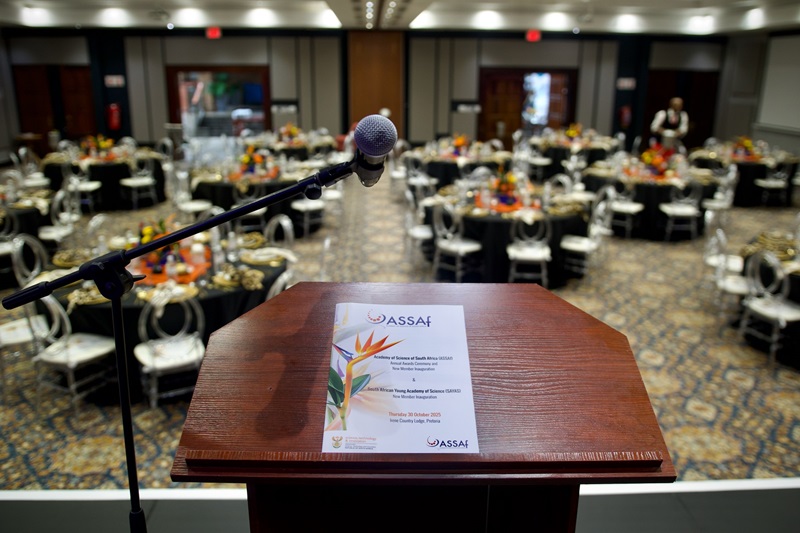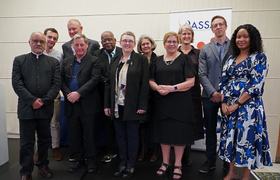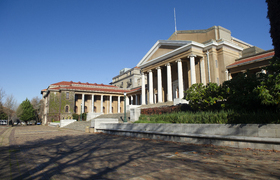ASSAf recognises UCT leading scholars’ research excellence
21 November 2025 | Story Sarah Marriott. Photo ASSAf. Read time 7 min.
At the annual awards ceremony held on 30 October 2025, a new cohort of distinguished scholars and scientists was welcomed into the Academy of Science of South Africa’s (ASSAf) ranks. Forty-five exceptional individuals – including nine UCT academics – were formally inaugurated as members of the academy.
Each year, new members drawn from the full spectrum of disciplines are elected through a rigorous peer-review process conducted by the full Academy Membership. Collectively, ASSAf members embody South Africa’s intellectual leadership and play a vital role in advancing evidence-based knowledge for the public good.
In addition, Professor Crick Lund, a UCT honorary research associate, was announced as a 2025 ASSAf Science-for-Society Gold Medal laureate. These medals recognise outstanding achievement in scientific thinking for the benefit of society.
An Honorary Professor in the Division of Public Mental Health at UCT, Lund is currently affiliated with King's College London. He was honoured for his outstanding and sustained contribution to public mental health in South Africa and across low- and middle-income countries. His pioneering research has deepened understanding of the links between mental health, poverty, and social development, directly influencing both global and national policy and practice.
Lund has led transformative multi-country programmes producing scalable, practical models for integrating mental health into primary care and breaking the cycle of poverty and mental illness.

Amongst those formally inaugurated as members of the acAademy, were UCT academics: Professors Michael Claeys, Imraan Coovadia, Lucy Gilson, Adam Haupt, Ursula Hoadley, Tom Moultrie, Andrea Rother and Associate Professor Zarina Patel.
Professor Claeys established a leading research program at UCT focused on Fischer-Tropsch catalysis. This is critical to South Africa’s synthetic fuels industry and the development of sustainable fuels from carbon dioxide and hydrogen. His research spans nanomaterials, catalyst development, and advanced characterisation of catalysts at working conditions (operando).
With extensive publications and patents, he collaborates with industry, particularly Sasol. He directed the c*change DSTI-NRF [Department of Science, Technology and Innovation – National Research Foundation] Centre of Excellence, manages carbon dioxide valorisation projects, and is actively involved in large Power-To-Liquids initiatives like the German Federal Ministry of Education and Research (BMBF) funded CARE-O-SENE consortium. As the founding chairperson of the Syngas Convention, he has shaped global discourse on synthesis gas technologies.
Professor Coovadia, director of the Centre for Creative Writing at UCT, is an acclaimed author and scholar whose work has enriched South African literature and shaped contemporary conversations on identity, politics, and art.
His works include a history of political poisoning in southern Africa, The Poisoners: on South Africa's Toxic Past (2021), a study of non-violent thought, Revolution and Non-Violence in Tolstoy, Gandhi, and Mandela (2020), a collection of essays, "Transformations" (2021) and a scholarly monograph, Authority and Authorship in V.S. Naipaul (2009).
He has also written award-winning novels including A Spy in Time (2018), Tales of the Metric System (2014) and High Low In-between (2009).
Professor Ele-Ojo Ataguba is an adjunct professor at UCT, the Canada Research Chair in Health Economics at the University of Manitoba, and an extraordinary professor at the University of Pretoria. His research examines the link between health, poverty and well-being, with a focus on health systems, particularly in low- and middle-income countries.
He is a respected health economist who previously served as director of the Health Economics Unit at UCT and as the South African Research Chair in Health and Wealth (2018-2020).
Professor Gilson, founding head of the Health Policy and Systems Division in the School of Public Health, is also a professor of Health Policy and Systems at the London School of Hygiene and Tropical Medicine.
Her research focuses on health system governance and financing issues and includes interest in the political and organisational processes of health policy change. She is engaged in a range of provincial, national and international health system collaborations located at the academic-practitioner interface.
This work includes concern for the practices and processes supporting the emergence of everyday health system resilience, including the role of system leadership and system learning.
Professor Haupt, director of the Centre for Film and Media Studies, is widely recognised for his research on media, music, and cultural politics in post-apartheid South Africa, where he is concerned with advancing critical thought on race, resistance, and representation.
He is coordinating editor of Global Hip Hop Studies and serves on the advisory boards for the first Hip Hop Book Series and CIPHER: Hip Hop Interpellation. He also serves on the editorial board of Drietalige Woordeboek van Kaaps, Communication, Culture & Critique, Journal of World Popular Music and on the steering committee of Die Societie virrie Advancement van Kaaps (SAK).
Professor Hoadley, based in Curriculum Studies in the School of Education, is a leading authority on curriculum theory and education policy whose research continues to influence national and global debates on equity and quality in schooling.
Her scholarship exploring the relationship between pedagogy, curriculum and social justice is grounded in real-world classrooms. She is internationally recognised for her contributions to education research, particularly in understanding curriculum reform and its relation to classroom pedagogies.
Hoadley's research is wide-ranging, including interdisciplinary projects such as the Mixed Methods Investigation of Learner Assessment, Progress and Support (MILAPS) project, working with economists and the Right to Read project with law.
Tom Moultrie is the Professor of Demography in the Faculty of Commerce, and a fellow of UCT. His research interests lie in trajectories of fertility decline globally, and the development and refinement of methods of demographic estimation from census, health, and civil registration data in low- and middle-income countries.
During the COVID-19 pandemic, he worked with colleagues at the university and the South African Medical Research Council to develop one of the few near-real-time mortality monitoring systems in low- and middle-income countries worldwide. In collaboration with health and climate scientists, this system is now also being used to investigate the links between extreme climate events (heatwaves, especially) and mortality in South Africa.
Professor Rother, head of the Environmental Health Division in the School of Public Health and Family Medicine is also deputy director of the Centre for Environmental and Occupational Health Research (CEOHR) at Edinburgh University.
As an environmental sociologist and environmental and public health professional, her expertise lies in the areas of chemical/pesticide risk management, risk communication, health literacy, exposure assessment, intervention development and policy analysis.
She is extensively involved in national and international policy development around reducing chemical and pesticide health and environmental health risks, and has wide-ranging experience in facilitation and capacity building, particularly in the Southern African Development Community (SADC) region.
Zarina Patel is an Associate Professor of Human Geography in the Department of Environmental and Geographical Science and deputy dean for Research in the Faculty of Science.
Her research addresses the politics and practices of achieving just and sustainable urban transitions. The focus of her scholarship is the simultaneous use of transdisciplinary approaches to navigate alternate insights and responses to complex urban issues in southern contexts, whilst foregrounding the diversity of forms of knowledge that are recognised as authoritative within these debates.
Her commitment to engaged and socially responsive scholarship extends to leadership positions including president of the Society of South African Geographers and Trustee of the Urban Studies Foundation.
A reflection of research excellence
Induction to ASSAf is a tremendous honour bestowed upon the country’s most excellent and internationally renowned researchers in recognition of their scholarly and scientific achievements in the service of society. The inauguration of the 2025 cohort brings ASSAf’s membership to 772 outstanding scientists and scholars, collectively representing the intellectual strength and diversity of South African science.
 This work is licensed under a Creative Commons Attribution-NoDerivatives 4.0 International License.
This work is licensed under a Creative Commons Attribution-NoDerivatives 4.0 International License.
Please view the republishing articles page for more information.










